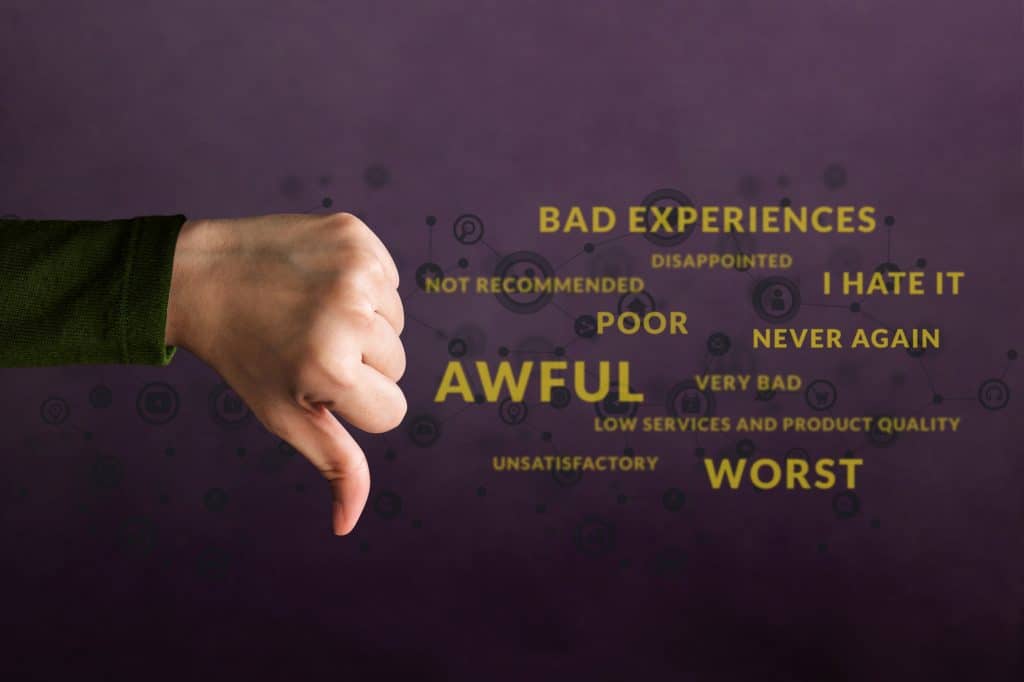There is a right and wrong way to fight bad reviews online. It’s far too easy to let your emotions get the best of you and respond in a less-than-professional manner. As a lawyer, you must follow the utmost in ethics when replying to even the harshest words online. Your firm’s reputation can be tarnished as a result of your responses to bad reviews, but you can also use these negative reviews as a way to show professionalism and boost your firm’s reputation.
The way that people find lawyers today has a lot to do with client feedback. Negative reviews can harm your firm’s business, and one survey states that 25% of people will go to the Internet to read reviews on their lawyer or find a new lawyer for their case.
The survey was conducted on 50,000 people.
Reviews online act as a way to validate a professional’s credentials prior to going to see them in person. If you ignore what is said about you online, no matter if someone sings praises or is trying to tarnish your reputation, you may miss out on a lot of business in the process.
Lawyers can and should take control of their online reviews.
Avoid Direct Rebuttals
As a lawyer, you know the law better than anyone else. If a client goes online and leaves a bad review, you need to be cautious when replying. It is your duty to keep the relationship private, and you have a legal duty to keep confidentiality no matter what the client writes in his or her review.
Lawyer client communication should be confidential, and anything you say can be used against you if a lawsuit is imminent.
Lawyers need to ensure that they are not providing a direct rebuttal that utilizes any confidential information. Instead of stating the facts right online, take the approach of trying to remedy the problem and listen to criticism.
If there’s one thing that the public loves, it is a lawyer that can respond to negative reviews and criticism seriously. As long as you don’t provide any confidential information, you’ll be able to respond online confidently. However, there is also another approach: writing to the reviewer directly. A private letter can be written to a reviewer if you know their information.
A simple letter that states: “I saw your review online, and I respect your right to voice your opinion. I want to make it right by you as a client, and in good faith…” You will then be able to discuss your own actions, and you may even provide some form of restitution.
In certain circumstances, turning a bad review into a positive one may be very beneficial for a lawyer.
There are several ways that you can attempt to fight a bad review online:
- Argumentative: I suggest avoiding this at all costs. You may be reprimanded by your state attorney disciplinary board if you reveal any client information in an argumentative way.
- Sympathetic: A sympathetic approach to a reviewer that is unhappy is a good option. This does not mean that you offer a refund to remedy the negative review, but it does mean that you may ask the individual to call you to determine a way to work things out together. You need to be concerned and sincere with your response.
- Informative: There are some reviews that are simply not proper. These reviews may lack the proper information to resolve the issue. You may take an informative approach, such as explaining that providing a consultation does not mean that you actually take on the case. If you are going to use the informative route, it is suggested that you do not appear defensive.
- Litigation: A review may be seen as defamation, and you may be able to sue as a result. This route should be taken with the utmost caution, and is often not a good choice because the bad press may potentially cripple your law firm.
- Quashing: In some cases, an attorney may provide a refund for a bad service provided. This can backfire if you do not approach this in the proper way. A client that was very unsatisfied and is offered only a small portion in terms of a refund is more likely to continue with their negative reviews. Quashing should only be provided in rare circumstances, and it is better to work with the individual to better understand what exactly could’ve been done better as their representative.
Online reviews will always be good and bad. It is important to take negative reviews seriously, and make any attempt to remedy a bad review online. Even responding in a respectful and concerned manner to a negative review will show readers that you are serious about customer service and keeping your clients happy with your service.



